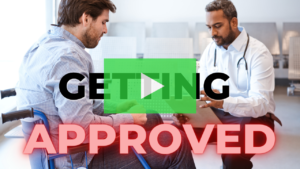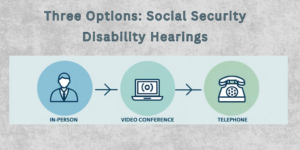Jump To:
- Step-by-Step Guide to Handling Vocational Expert Testimony During a Disability Hearing
- When Age Becomes a Factor
- What Are Vocational Skills?
- How They Evaluate Your Education
- Does the Vocational Expert Have the Final Say?
- Medical Records & Disability Claims
- Here’s How We Can Help
Don’t panic!! The vocational expert is only a witness in your disability case. The Judge has the final say, and there is always the option to file for an appeal.
For context, a vocational expert is a professional who studies jobs in the national economy, workplace environments, and employment trends. They help an Administrative Law Judge better understand the demands of jobs in the national economy and the expectations of employers. They often provide input about how your limitations would impact your ability to sustain employment and play a vital role in SSA’s determination of eligibility for benefits.
After reviewing your file and taking your testimony the Judge will give the vocational expert a list of limitations the Judge believes are supported by the record. This is done by asking the vocational expert about a hypothetical person your age, education, and work history. A set of limitations are then presented regarding worker abilities like standing, walking, sitting, lifting, carrying, understanding, remembering instructions, and social interaction.
The vocational expert will take this list of what you can do at a maximum and compare it to what employers require at a minimum from their employees. Remember the vocational expert does not review your records or set your limits. Their entire role is to give insight into the impact of those limits in the workplace.
To recap, here’s what the vocational expert will take into consideration:
👉 Your age
👉 Your skills and experience gained from past jobs
👉 Your education level
👉 The limitations of your disability as the Judge sets them
Step-by-Step Guide to Handling Vocational Expert Testimony During a Disability Hearing
Understand the Role of a Vocational Expert:
- Who are Vocational Experts (VE): Experts who testify about the types of jobs you can perform despite your disability.
- Their Goal: To determine if there are any jobs available in the national economy that you can do.
Preparation Tips:
- Review Your Medical Records: Ensure all medical documentation is up-to-date and accurately reflects your limitations.
- Understand Your Limitations: Be clear about what you can and cannot do.
- Practice Testifying: Prepare to explain your condition and its impact on your daily life and work capabilities.
During the Hearing
- Listen Carefully: Pay attention to the vocational expert’s testimony.
- Provide Clear Testimony: Answer questions honestly and clearly about your limitations and previous work experience.
- Cross-Examination: Your attorney can question the vocational expert to challenge their findings or highlight inconsistencies.
Post-Hearing
- Follow Up: After the hearing, ensure you understand the next steps and timelines for a decision.
Tips for Success
- Stay Calm: Keep your composure during the hearing.
- Be Honest: Accuracy is critical when discussing your limitations and capabilities.
- Consult Your Attorney: Work closely with your legal representative to prepare and respond effectively.
When Age Becomes a Factor
“I’ve already proved that I can’t do my job anymore! I physically/mentally can’t go back for at least a year. This decision was unfair. 😔 “
This is something I often hear when a person is denied disability benefits, and it’s absolutely a valid feeling. But remember, the primary reason a vocational expert is in your hearing is to determine if your ability, with the disability, will allow you to work. Your age plays a factor in this decision; the older we get, the less likely employers are going to spend money, effort, and time to re-train us. For workers over 50 (and especially those over 55), the vocational outlook sours and the opportunity to be retrained for a new and easier job is diminished.
So if you’re a younger applicant, it becomes more difficult to prove why you can’t return to the workforce in a new line of work. You’re young enough to learn a new, easier job.
What Are Vocational Skills?
In a nutshell, the vocational analysis looks at past work you did long enough and detailed enough to learn or master the job. The length of time it takes to learn how to adequately perform job functions varies for each job. Some general laborer-type jobs can be learned in an afternoon, while others take years to master. Social Security looks for skills you might have learned that make your transition to a new job easier.
To give a few examples, having experience in car sales has potential success in transferring to a role in telemarketing, and working in a body shop might help you estimate repair costs in the front office. So in some cases, even if you are over 50, you might possess skills that overcome the reluctance of an employer as the degree of training needed for the new job is reduced, meaning the SSA might conclude that you still have market potential.
You need to make sure you do a good job of detailing your past work so that SSA does not attribute skills that you did not acquire.
How They Evaluate Your Education
Generally speaking, the more education you have, the less likely you are to be approved. There are a few things to consider though. For example, vocational or trade school teaches us the information needed to be successful in the current workforce and with current processes. The further we are from this education, the less it’s valued. Think of all those TV repairman classes from the 1980s. By now, those skills are more or less obsolete.
Applicants over age 50 and 55 have special rules if they pursued lower levels of education. For example, a worker over 55 with an 8th-grade education and only hard labor work history has very few occupational options regardless of his or her health concerns. As such, Social Security adjusts the rule to where very little is needed to establish disability.
Does the Vocational Expert Have the Final Say?
The answer is no. They are expert witnesses whose credentials are under review, as is their opinion. Their testimony has to be well-supported and consistent with government-endorsed publications.
Perhaps most importantly, they have to be logical. I once had a judge limit my client to work environments with no exposure to hazardous machines; yet, the vocational expert testified my client could work as a deli slicer using an industrial meat slicer. It’s hard to imagine a more dangerous piece of equipment 🤦♂️
If the Judge decides the Vocational Expert’s testimony is questionable, they can reduce its worth or disregard it entirely. The government publication used by vocational experts was issued in 1973 and lists all of the jobs in America. A lot has changed since 1973, and some jobs in this book are no longer available or done completely differently. Think about medical records: clerks used to file folders in huge file rooms, but now work at a computer desk all day.
When they’re evaluating your limitations, it’s not just the testimony that they’re considering. The Judge will look at everything. Their decision will be made by a comprehensive review of medical records, the strengths and weaknesses of your application, your job history, and your ability to communicate your unique situation.
Medical Records & Disability Claims
THIS 👏 IS 👏 SO 👏 CRUCIAL 👏
It is important to remember the adjudicator or judge will review your medical records and use these and your testimony (or the questionnaire you complete) to set the limitations given to the vocational expert. This means your condition needs to be well-documented and accurately recorded.
If you’ve been experiencing new or changing symptoms and haven’t communicated them to your doctor, then it’s possible that they’ll be overlooked during your evaluation and absent from your records. Disability determinations are not based on how you feel, but rather on your doctor’s objective recordings.
Here are some tips that I always encourage my clients to practice:
- Stop saying “I’m fine” when you’re not. Your doctor is paid to address your complaints!
- Be specific when you’re explaining what’s wrong. A backache isn’t the same as crippling pain.
- Don’t dismiss symptoms just because they’re not the primary reason for your visit.
- Be consistent with your complaints. Don’t leave out symptoms because you assume your doctor already knows.
Suggested Video: Do THIS at your Dr. Appointments to Build a Strong Case
Here’s How We Can Help
As a local representative, our disability advocate will know your case from start to finish. We’ll be involved every step of the way, and you’ll speak to the same person every time. Our goal is to make your case the easiest one to approve. For that reason, we don’t just fine-tune what you have and put it together in a cut-and-paste format. We’ll meticulously review your case and provide feedback on the weak areas of your application and offer clear directions on what information we need and where you can find them.
Whether you’ve already begun the application process or are just getting started, we encourage you to schedule a FREE consultation to help determine the best strategy for your case. Our mission is to eliminate the red tape and mountains of paperwork so you can focus on your health and the things that matter.
Written by Roy, a dedicated Disability Representative, has been advocating for individuals seeking disability-based programs since 2003. With his background working for the government, Roy brings a deep commitment to improving assistance programs for those in need.
⏰ Schedule an appointment from anywhere in the US! – https://calendly.com/roys-calender 📱
Let’s Connect!
✅ Facebook: Add Me!
✅ Instagram: Join the Fun
✅ Twitter: Follow
✅ YouTube: Subscribe Here
The Disability Process 101
- Programs available
- How to apply or appeal
- How disability is determined
- Tips for how to build a strong case
📞 417-812-6698
UR Disability Rep
👌 URDisabilityrep.com: I want to be YOUR disability rep






